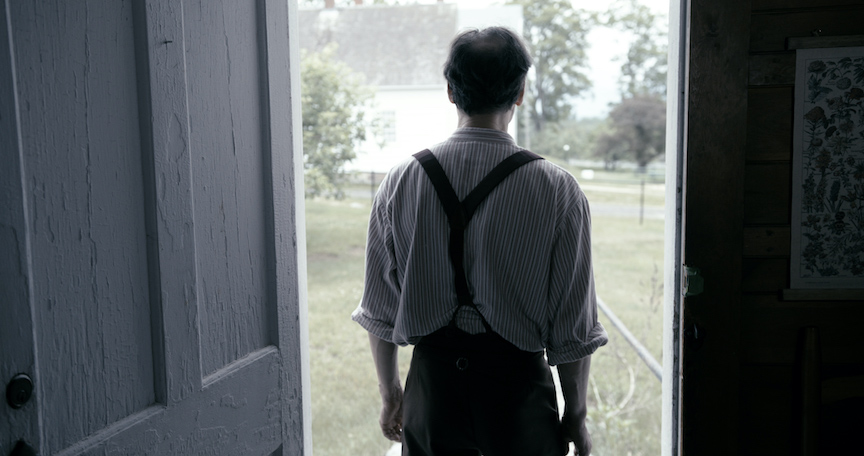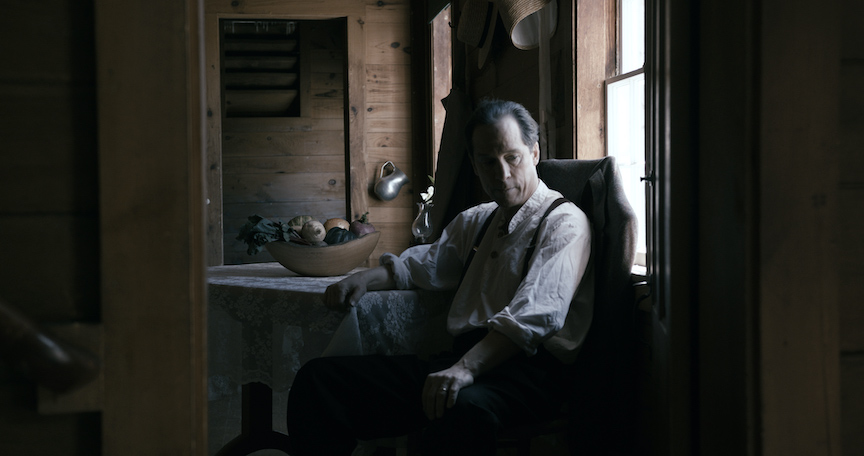Canterbury Shaker Village Serves as Backdrop to Film Adaptation of Robert Frost Poem
A poem written by Robert Frost that explores the complexity of grief, Home Burial is the subject of a film adaptation by Donald Tongue that recently wrapped up filming at Canterbury Shaker Village.
“Post-production has already started,” said Tongue, who said his film represents his interpretation of the poem, whose subject is a husband and wife who have recently lost their child. “They are working through the grief and their loss and trying to come to acceptance.”
This acceptance will not come, however, in part because they each approach their grief differently. “He is in denial while his wife feels trapped by her grief,” he said. “There is an extreme tension between them.”

This tension is seen in the poem (and film) with the woman staring out the window at the burial site of the child, an act whose meaning seemingly escapes her husband. “He is clueless about why she looks out the window,” he added.
According to Tongue, Frost’s use of dialogue in the poem lends itself to film. “I feel like in researching Robert Frost that his poetry is very cinematic,” he said.
He cited the dialogue in the film to illustrate his point. “The film’s dialogue is strictly from the poem,” he explained. “Frost wrote straight-up dialogue in a lot of his poetry.”
In Home Burial, Tongue said Frost may have also been writing about himself and his wife, Elinor, and their respective (and differing) approaches to grief. “They lost their first child,” he noted. “This poem is him working through his own grief and trouble.”
Like the characters in the poem (and film), this trouble may have also involved breakdowns in communication. “He was a very troubled individual,” said Tongue, “and I believe Frost and his wife were not on good terms in a lot of ways.”

In adapting the poem to film, Tongue said he added both a prologue and epilogue. In the prologue, the film depicts the preparations for the burial and her reactions, whereas the epilogue shows the woman at the child’s grave and the husband collapsing on the stairs in anger, grief, and fighting back tears.
“I’m trying to show they are both moving on,” said Tongue, who cited undertones of an unhealthy, possibly abusive, relationship between the two. “By the end of the poem and film, we see the woman is in control—she is no longer the victim,” he said. “She pours out her grief, but the man is still unable to acknowledge her anguish.”
As for when and how the film will be released to the public, Tongue said these details will be determined in the coming months. “I may offer an advance showing at the Village,” he said.
According to Leslie Nolan, executive director of the Village, he would be welcomed back. “Donald and his team were an absolute pleasure to have here,” she said. “The scenery and landscape at the Village is the perfect backdrop for period pieces, so this is a wonderful way for us to showcase the unique beauty and splendor of this property.”
To learn more about Donald Tongue, a resident of Londonderry and founder of Tongue Mountain Productions, visit facebook.com/TongueMtProductions.
About Canterbury Shaker Village
Featuring 694 acres of forests, fields, gardens, nature trails, and mill ponds under permanent conservation easement, the Village is designated as a National Historic Landmark with 25 restored original Shaker buildings and 4 reconstructed Shaker buildings. In addition to tours, exhibits, and programs, Canterbury Shaker Village provides wonderful, relaxing, and beautiful indoor and outdoor spaces for weddings.
Canterbury Shaker Village is a member of the NH Heritage Museum Trail, which connects the public with culturally rich heritage institutions in New Hampshire. For more information about The Trail, visit nhmuseumtrail.org.




